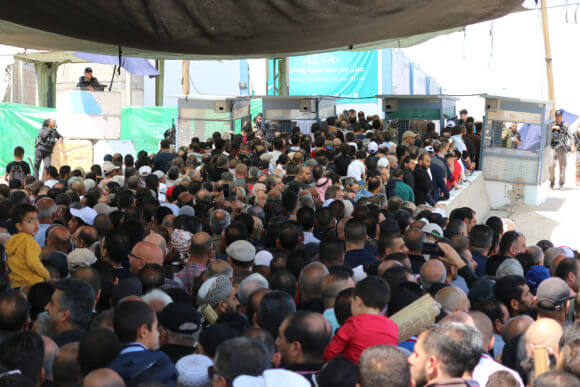What comes to mind when someone uses the term “pedestrian crossing”? Do you think of the diamond-shaped, bright yellow sign with a figure in motion plastered in the middle? Or of a dashed white line spanning between two streets or across an intersection? Maybe it’s a footbridge. Or even a traffic-controlled light that tells you when to stop and go.
Apparently, to the U.S. government, pedestrian crossings are also heavily militarized checkpoints outfitted with armed soldiers, surveillance cameras, biometric screenings, metal turnstiles, and AI-powered weapons.
At least that’s what U.S. Office of Palestinian Affairs officers told an audience of American citizens in a virtual town hall on Thursday, August 17th. On multiple occasions, when answering questions about new Israeli entry procedures for Palestinian Americans, Wilbur Zehr, the Chief of American Citizens Service at the Jerusalem Embassy, ostensibly referred to the hundreds of Israeli military checkpoints that dot across the occupied Palestinian territory, as “pedestrian crossings.”
These are the same checkpoints, in case you are unfamiliar with Israel’s apartheid system, where Palestinians are subjected to long and crowded lines, humiliating searches, harassment, violence, and even death at the hands of Israeli forces. These are the checkpoints where Palestinian women have been forced to give birth, the checkpoints that separate families and cut off Palestinians from their land and communities.
But I digress.
To understand the context in which Mr. Zehr was so exuberantly discussing Israel’s unassuming “pedestrian crossings,” bear with me as I take you a few steps back.
Over the past month, Israel has been testing a “pilot program” to loosen its borders for Palestinian Americans, hoping it will be accepted into the coveted U.S. visa waiver program.
The pilot program has allowed Palestinian Americans, among other things, to travel through Tel Aviv’s Ben-Gurion Airport. Being able to travel through the airport seems like a no-brainer as it should already be the standard for citizens of the country that gives the most money to Israel in the world. But the news was a big deal for thousands of Palestinian Americans who routinely travel between the two countries but have largely been forced to use the land border crossing with Jordan to enter the country.
As an American living in Palestine for the better part of the last decade, I, like most people, was skeptical when the pilot program was announced. At my core, I was angry and frustrated that the U.S. was even considering Israel for the visa waiver program. Forget about the decades of mistreatment at borders and checkpoints of American citizens of Palestinian, Arab, and Muslim descent. What about the occupation? The apartheid? The killing of American citizens and journalists? All of the above? Also, the visa waiver program aside, shouldn’t the U.S. government have already cared about how and why its citizens were mistreated at borders and checkpoints?
I knew we were never going to win the moral battle. After all, the U.S. continues to fund Israel with hundreds of billions of dollars in military aid each year, despite its growing mountain of human rights abuses.
More upsetting than that, even before seeing what the pilot program looked like in action, on a personal level, I also knew that no matter what the U.S. and Israel told us or tried to gaslight us into believing, we were not going to be treated the same as American Jews or Christians, or non-Arabs who travel to Israel for tourism, work, or to visit family.
Since the first time I traveled to Palestine nearly ten years ago, I’ve come face to face with Israel’s discriminatory border, permit, and visa policies when it comes to Palestinians or those affiliated with them. I didn’t believe that Israel could, or would, even remotely ensure equal treatment of Palestinian Americans, or Americans of Arab and Muslim descent, into the borders it controls.
Over seven years, I’ve learned that my American passport isn’t worth as much as I thought it was, so long as I’m in any way affiliated with Palestinians. I’ve been turned around at borders, interrogated about my religion, harassed and accused of supporting terrorism because of my relationships with Palestinians, and denied a visa time and time again. I’ve paid thousands of dollars in legal fees and security deposits to the Israeli government, gone to court, and been separated from my family, all so that I could simply live with my family and work as a journalist in the West Bank. After years of fighting, I’ve managed to secure a very uncertain and very temporary, single-entry West Bank-only visa that can be revoked or denied at any time. It’s not ideal, but it’s more than most have, and for that, I am grateful.
When I saw the details of the pilot program, my skepticism was, unsurprisingly, confirmed.
One would expect that Israel treating American citizens equally, regardless of race or ethnicity (the entire premise of this trial period), would translate into some pretty basic and clear regulations. Something like “all Palestinian Americans, regardless of where in the Palestinian territory they come from, are free to travel in and out of Israel visa-free for a period of X days”.
But of course, as expected, the new regulations came full of footnotes, qualifications, caveats, and more. Different rules applied to Americans with different statuses and backgrounds: there were going to be special rules for those without Palestinian IDs, those with West Bank IDs, those with Gaza IDs, and so on. At the end of the day, Israel was still going to reserve the right to deny anyone entry based on “security concerns.” The regulations (like other “pilot programs” greenlit by the U.S. before it) are intentionally vague, the processes are opaque, and thousands of Americans and Palestinians were still left scratching their heads as to how these new laws would apply to them.
So, in short, Israel was still differentiating based on people’s backgrounds and where they were from. The exact opposite of what this entire program was meant to achieve. And yet, the U.S. has continued to applaud Israel for its efforts, and celebrate the pilot program and the alleged “loosening of restrictions”.
Essentially, we were being thrown some crumbs, while Israel’s boot stayed firmly on our necks.
From the beginning of this whole ordeal, the one question I’ve asked myself through it all, is: does the U.S. government, its embassy, and its “Office of Palestinian Affairs” really think we are that stupid?
Did they really think that we would believe that Israel was interested in the business of equal rights? And that our own government gives a damn about our equal treatment? Or that we would really be convinced by the charade that the two governments are putting on?
Well, apparently, they do.
Now, back to Mr. Zehr and his “pedestrian crossings.”
On Thursday, the 17th of August, nearly one month into the pilot program, the U.S. Office of Palestinian Affairs in Jerusalem hosted what they called a “virtual town hall” to discuss the “new entry procedures” for U.S. citizens.
When I was forwarded the invitation to attend the virtual Facebook live event, I was once again immediately skeptical. Firstly, the town hall was listed as only being 30 minutes long, not nearly enough time to answer all of my questions, let alone the questions of thousands of uncertain Americans. But when I saw a link to a portal to ask questions, I once again felt a tinge of hope.
That hope was quickly dashed when I realized there was a 160-character limit per question – barely enough to write a sentence. But, I thought, If I wrote enough questions, one of them was bound to be asked. And so I started typing away. As I scrolled through the dozens of questions left by other American citizens, I realized that I was not alone in my total confusion surrounding these procedures.
Some commenters asked about how the rules apply to Gazans, others asked about how to apply for certain permits depending on if you have a Palestinian ID or not, some asked if they would be able to drive in Israel, while others, like me, asked what would happen to American spouses of Palestinians, living on temporary “West Bank only visas.”
As I read through the sea of questions, it became even clearer than before just how opaque this whole process was, how intentionally vague the U.S. and Israel were making things, and how much there was still left to be answered.
But, we still had 30 minutes on Thursday morning. And I was hopeful that some of these questions, many of which dealt with the same issues, would be answered.
I couldn’t have been more wrong.
After a minute of introductions, the questions finally began. Or at least, the part where an American official reads off some questions left on the portal began.
Moderator: Can US citizens registered as residents of Gaza enter or transit in Israel?
US official: Not yet, we know this has caused some confusion. The Israeli government has publicly committed to announcing and implementing procedures related to the entry of US citizens and Gaza residents by September 15.
Okay, I thought, a question about Gaza. The answer wasn’t too promising, but at least they are asking the right questions.
Moderator: Second question , can US citizens cross into Israel by vehicle from the West Bank?
Jerusalem ACS Chief, Wilbur Zehr: Israel says a US citizen that is registered as a resident of the West Bank can cross into pedestrian crossings in the West Bank, except Erez crossing into Gaza. US citizens who are also Palestinian Authority ID holders must use pedestrian crossings, and not as drivers of a vehicle or as a passenger of a vehicle, taxi or bus. Anyone, even US citizens, even those with a valid entry B2 permit, may be requested to exit a vehicle and processed through as a pedestrian if the crossing has both vehicle and access. Otherwise you may be redirected to a crossing with pedestrian access.
As I gawked at my screen, watching a cheerful Mr. Zehr went on about “pedestrian crossings”, everything fell into place. Nothing was changing. Nothing was going to change. He was essentially saying, in a bunch of words, that Palestinian Americans were still going to be subject to checkpoints at the discretion of Israeli officers manning those checkpoints, no matter what visa they had.
It only got worse from there.
For the next 12 minutes, the moderator posed eight more questions. Two more had to do with driving and renting a car, one had to do with why certain visas are different colors, another had to do with green card holders and permanent U.S. residents, and one had to do with what happens if you are mistreated at an Israeli border crossing. Spoiler alert: If you are mistreated at a “pedestrian crossing” in the West Bank, the U.S. government says you should report it to COGAT, the Israeli government body responsible for enacting its policy in the occupied Palestinian territory. The same agency that is now being run by one of Israel’s most right-wing government ministers, and the agency that’s responsible for approving illegal settlements and issuing demolition orders against Palestinian homes. So, a pretty fair arbiter in the affairs of Palestinians.
(It’s also the same agency where I’ve been called in for interrogations, questioned about my religion, political affiliations, and whether or not I like Donald Trump: yes, for real.)
And then, after 12 minutes and 2 seconds, the livestream ended. A total of 10 questions, three of which related to logistical issues around driving, were asked and vaguely answered.
And that was it. That was the extent to which the US government felt it needed to address the questions of thousands of its citizens who are still so obviously in the dark on where they stand, and how this new “pilot program” affects them. Not only did the moderator not even ask five percent of the 260+ questions left on the question forum, they didn’t even bother to use half of the allotted time for the “town hall.”
To say it was a slap in the face would be the understatement of the century.
As I sat in disbelief at what I had just witnessed, there was no more question as to whether this entire operation – the trial period of pretending that Israel would start miraculously treating Palestinians, their friends, and families like real human beings – was just a charade. That Israel and the U.S. were once again throwing us breadcrumbs, leading us down a path that led to the same old misery that we’ve been experiencing for decades, laughing in our faces along the way



No surprise.
The US government doesn’t think we’re stupid. It thinks, it knows, we are powerless. So does the Israeli government, of course.
Excellent reporting, Yumma, again!
What a bassa.
Brings back memories of going by car from Swaziland into apartheid South Africa (Zululand) in the 70s, with Indian friends… the tangible, racist contempt (especially directed at me for being with them!) of the white Afrikaner soldiers and police on the border — ironically, the main clients of the Swazi sex trade in those days…. Apartheid has some fascinating sub-chambers of the psyche…
But I have a question, Yumna: You say what happens if you are mistreated at an Israeli border crossing? I remember reading that the US Embassy will monitor the system, so I googled and found this URL:
https://il.usembassy.gov/mascot-message-israel-entry-exit/
which directs you to a form to report experience of discrimination or any other problem, including denial of entry:
https://forms.office.com/pages/responsepage.aspx?id=dFDPZv5a0UimkaErISH0S3k54wgSN71Bs_xpxUGsY7dURUhMNlc5SlFHS0ZMRVIyTzBYNFpRQVoyWC4u
I wonder if the system can’t be leveraged for meaningful change? Maybe there are decent people at the State Dept. who genuinely care about improving the lives of Palestinians and want to end the apartheid. So this “quid pro quo” could be a useful catalyst? Worth trying, insha’allah. Freedom is inevitable, it’s too much at the heart of humanity’s basic needs.
Begging the old question: how long? (And not sure we have that much time, given the givens…)
If the Visa Waiver Program encourages the permanent relocation of a Zionist colonial settler to the USA, the Visa Waiver Program would be a good thing even if the Zionist state does not deserve to enter this program.